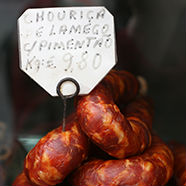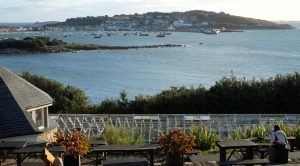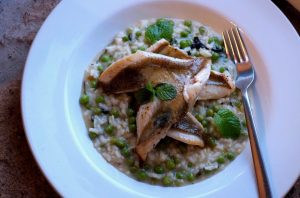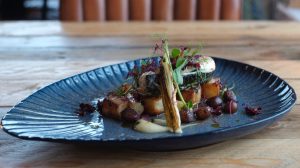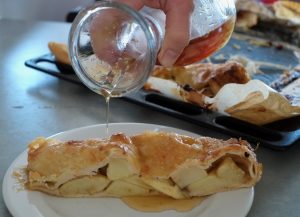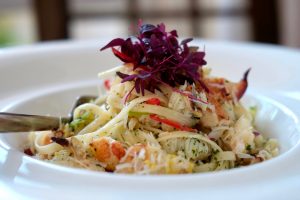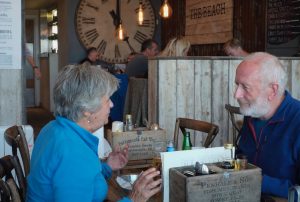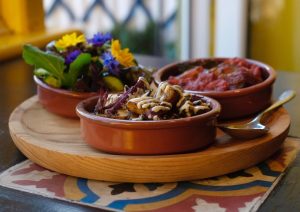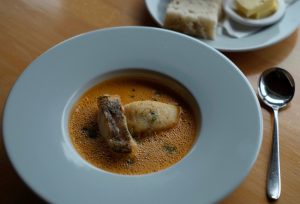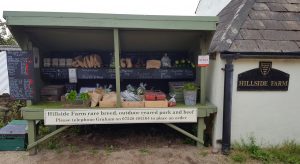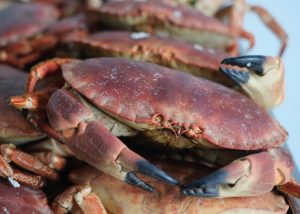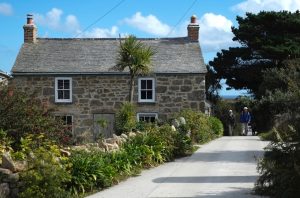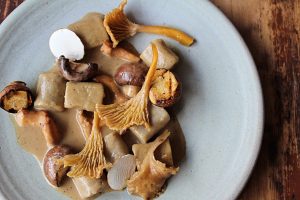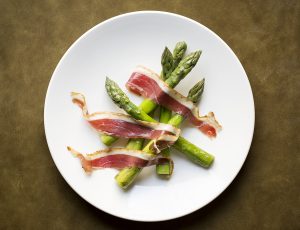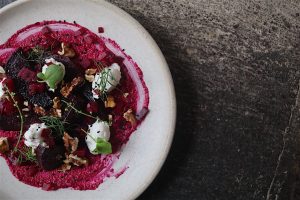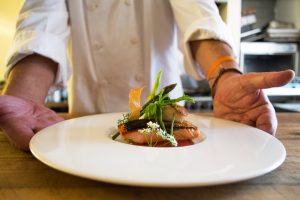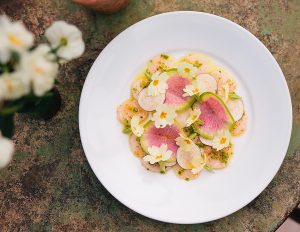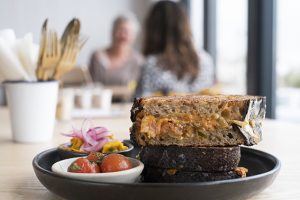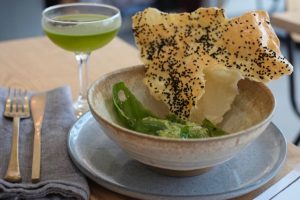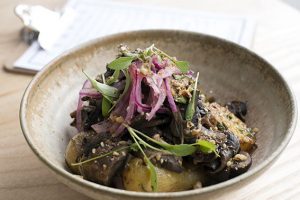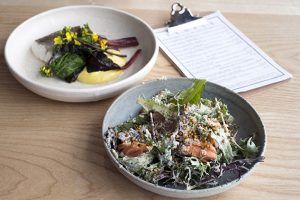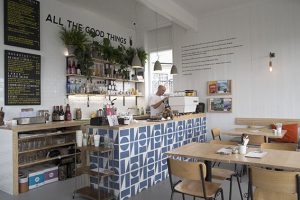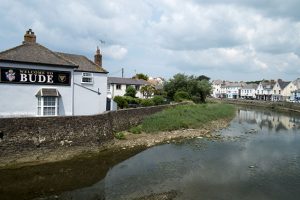One of the many lovely things about eating out in the Isles of Scilly is that while you do so you can usually see the place where your meal was born. Food generally travels yards not miles. So bag a seat at Juliet’s on St Mary’s (pictured above) and you gaze over the bay in which the crustaceans for its crab sandwiches were caught, and below, the century-old greenhouses where Juliet’s family cultivates tomatoes that taste like your grandad’s used to taste (and if you’re lucky, you’ll grab a stonking sunset too). Boat it to Tresco to eat in its New Inn or Flying Boat, and you’ll be offered a Beef and Stilton pie or sirloin steak using beef from the island’s herds of Devon Red and Limousine cows which you’ll have passed. On Scilly you won’t find Michelin stars (although there are plenty of the other kind in its pristine skies) or celebrity chefs. But you will find food that’s as fresh and local as anywhere in the British Isles. Time your visit to coincide with Scilly’s annual Taste of Scilly Festival throughout September.
I recently ate my way round the Isles while researching a food feature for their annual guide (read the 2019 one here). Here are ten of the many places I can recommend (with pictures taken by me):
Juliet’s Garden Restaurant, St Mary’s
This old-time favourite, owned and run by Juliet May, may have been going for nearly 40 years but hasn’t lost its touch. One of the best things about it (apart from the crab sandwiches and tomatoes) is that it’s a fifteen minute walk from Hugh Town, so you’re suitably hungry when you get there. The views are as delicious as the food, and almost as good inside the glass-fronted restaurant as outside on the terrace.
On the Quay, St Mary’s
As its name suggests, this industrial-chic hangout is right on the quay where Scilly’s inter-island launches depart from, and its balcony is a prime spot from which to view its famous May bank holiday gig races. We loved its contemporary vibe, original pine floors and art-daubed timber walls. Much of the spacious interior is created from reclaimed materials, including scrubbed wooden tables made from scaffolding planks and poles and a well-stocked bar formed from the steps to Porthcressa beach! Sensibly-priced food hovers between casual and fine dining, so there’s something to please everyone. We loved the grilled mackerel fillets with salsify, baby fennel, parmentier potatoes and celeriac puree.
Strudel in Town, St Mary’s
This tiny cafe (attached to a hairdressers) on the main drag of Hugh Town is the second of two strudel cafes owned and run by German-born Sabine Schauldolph. Grab the table in the window to see the goings-on on Town Beach, and choose from a range of Bavarian goodies; the must-eat, of course, is Sabine’s apfelstrudel, made daily from locally grown apples and served with generous lashings of clotted cream.
The Spirit Restaurant, St Mary’s Hall Hotel, St Mary’s
Sustainability and provenance are the catchwords at this gastronomic boutique hotel, in the centre of Hugh Town. So the hotel will even be able to tell you the name of the Scillonian boat that caught the crab accompanying your linguine for starter! Meat all comes from the owner’s Gloucestershire farm which slow-rears rare-breed cows, pigs and sheep.
The Beach, Hugh Town, St Mary’s
Feel the sand between your toes as you eat that this joint, housed in a converted boat shed on Porthmellon Beach. In summer you can sit out on the balcony and watch the sunsetting over Samson and Tresco. But, with its scrubbed wood tables and reclaimed wood walls and blackboard menu, it’s equally atmospheric inside. The restaurant is owned by St Mary’s Hall hotel, so you can expect the same scrupulous sourcing of both (rare-breed) meat and seafood – but here it’s barbecued. Lobsters come half or whole, with a choice of flavoured butters, and burgers (in a sourdough roll) are from 28-day-dry-aged Gloucester beef. If you want the real deal, plump for the Beach Surf and Turf Burger which combines the two.
Dibble & Grub, Porthcressa Beach, St Mary’s
The building housing this friendly, Moorish-feel restaurant used to be a fire station – hence the name borrowed from two of the firemen in the Trumpton children’s TV series. The style is Spanish tapas but the ingredients are very much Scillonian. If you want to eat truly local, opt for the Taste of Scilly menu which, on the night I visited, included butternut squash, courgettes with tomatoes, and edible flowers and leaves (pictured below). The service, convivial atmosphere and coffee are as wonderful as the food.
Hell Bay Hotel, Bryher
Made it to the tiny island of Bryher? Sit by the fire in the bar along with contented dogs and anoraked walkers, or settle into one of the hotel’s restaurants; either way the food is firmly rooted in Bryher’s earth and sea. Vegetables and strawberries come from Hillside Farm, down the road, while fish is from Island Fish, near the landing stage. In summer, get your fingers sticky in its Crab Shack, in the hotel grounds, where you feast on locally caught crab and mussels, followed by Eton mess from Hillside strawberries. Heaven.
Hillside Farm, Bryher
If you’re self-catering you might not want to eat out every evening, so the roadside honesty stall at Hillside Farm is a godsend. Stacked with everything from asparagus to eggs, courgettes, tomatoes and strawberries, it has everything you could need for a gourmet supper. There’s meat too – beef from their North Devon cows and pork from their Saddleback pigs.
Island Fish
Doubling up as a fish shop and cafe, Island Fish – by the landing stage on Bryher – is the place to get ready-to-eat crab. It’s run by brother and sister Amanda and Mark Pender whose family who have been fishing for three generations, and their operation now includes a boat run by Amanda’s teenage son. On Thursday evenings, Amanda and Mark’s mum makes seafood paella which you eat on the verandah, and on Sundays Mark grills lobster which he serves with potato wedges and coleslaw for a tenner. “People are often scared of shellfish,” says Amanda. “We try to make it accessible.”
Westward Farm Gin, St Agnes
Offbeat, quiet and stunningly beautiful, St Agnes has attractions enough. But add ice-cream and gin to the mix, you have something that in my book is something approaching heaven. The ice-cream and clotted cream produced at Troytown Farm at the end of the island’s single road has been amply covered but the gins at Westward Farm are new. Westward Farm has long been producing essential oils (some of which are used in Troytown’s ice creams) and now they’re using them in their gins, along with foraged botanicals such as gorse flowers and kelp which are the key ingredients of their Wingletang gin, named after their local downs.




